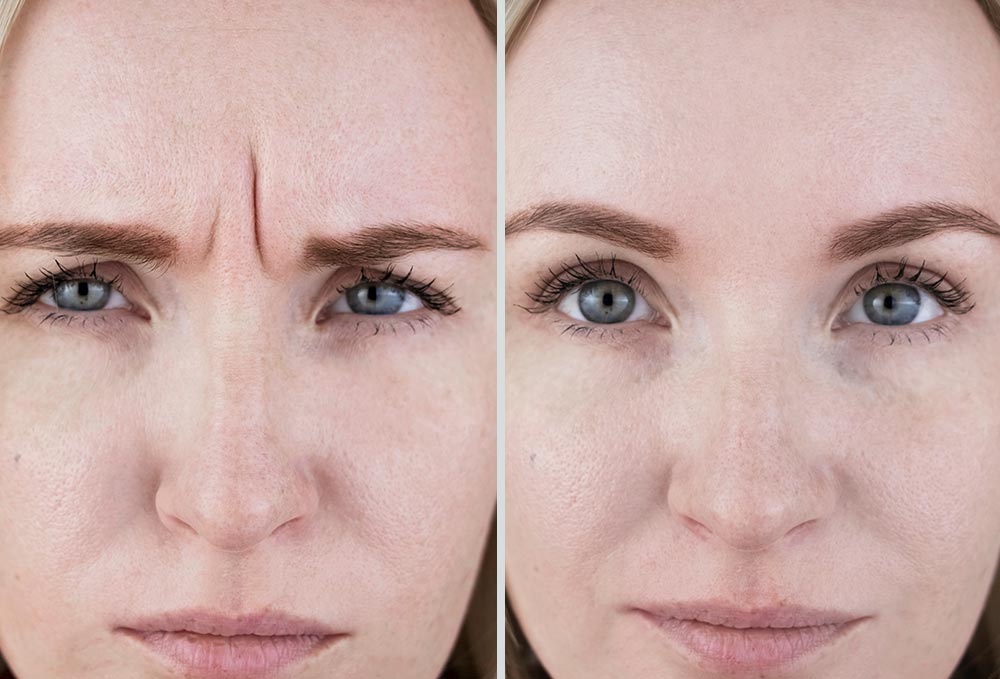BOTOX®

BOTOX® Injections
BOTOX® injections have several different uses, including treating migraines and ptosis. At Westlake Eye Specialists, our oculoplastic surgeons have extensive experience treating these conditions.

What is BOTOX®?
BOTOX® is a form of botulinum toxin, a neurotoxin produced by the bacteria Clostridium botulinum. Botulinum toxins are neuromuscular blocking agents.
These agents block chemicals that contract muscles and send pain signals. When injected into a muscle, BOTOX® freezes all activity in that muscle while it is active in your system.

Who Uses BOTOX®?
BOTOX® is one of the most well-known cosmetic treatments in the world. While it is famous for treating wrinkles, it has other uses as well.
Because of its neurotransmitter-blocking capabilities, BOTOX® has a wide range of applications. Two lesser-known benefits of BOTOX® injections are treating migraines and mild ptosis.
BOTOX® Treatment For Migraines
The FDA approves BOTOX® to treat chronic migraines in adults. The definition of chronic migraine is experiencing headache days at least fifteen days a month.
If you experience fewer than this, you do not have chronic migraines, and BOTOX® is not a treatment option. BOTOX® can also treat migraines in adolescents or children, but insurance may not pay for it.
How Does BOTOX® Reduce Migraines?
BOTOX® gets injected around pain fibers that cause headaches. It enters the nerve endings near the injection and blocks the release of pain chemicals. Blocking these pain transmitters prevents the activation of pain networks in the brain.

What is Ptosis?
Ptosis is a slackening in the muscles that hold your upper eyelids in place. Your eyelids can sag low enough that they block your vision.
When this happens, your brow furrows in a reflexive response to your eyelid drooping. The muscles around your eye contract to support the eyelid, even though they can’t actually hold it up.
As the muscles around your brow tense to support your drooping eyelids, they create asymmetry around your eyes. BOTOX® gets injected into the asymmetrical muscles caused by perpetual contractions.

How Does BOTOX® Treat Ptosis?
BOTOX® can treat minor cases of facial asymmetry caused by mild ptosis. It is a cosmetic ptosis treatment, not a corrective one.
BOTOX® does not treat the sagging muscles that cause your ptosis. It gets injected into the muscles around your eyes to eliminate the asymmetry created by mild ptosis.
As the toxin begins to take effect, these muscles relax and stop contracting. By blocking the muscles around your eyes from flexing, you end the asymmetry.
BOTOX® can reduce the imbalance caused by minor ptosis. But it is a temporary treatment, not a permanent solution.
Is BOTOX® Permanent?
BOTOX® injections wear off three to six months after they take effect. For most patients, this means that the lopsided appearance that occurs due to ptosis could return. The same is true with migraines as well.
But you can maintain symmetrical facial features and migraine-free days with more treatments. Getting BOTOX® injections two to four times a year can keep your muscles relaxed and pain signals blocked.
What is Treatment Like?
BOTOX® treatments with Dr. Saulny take about 20 minutes. He uses a tiny needle to inject small amounts of BOTOX® into shallow muscles in your skin.
BOTOX® treatments are swift and pain-free. Most BOTOX® patients say there is no discomfort at all during their injections.
There is minimal recovery from BOTOX® as well. All you need to do is not touch the injection site and keep your head upright for thirty minutes afterward.
You can get BOTOX® in the middle of the day. It won’t interrupt your everyday life, and there is no lengthy recovery period after.
It can take up to six months to see the full benefits of BOTOX®. In the meantime, continue your everyday routines, including taking any prescribed medications.
Do you want to learn more about BOTOX and if it could help you? Schedule a consultation at Westlake Eye Specialists in Austin, TX, today!
Request A
Consultation
To request a consultation with Westlake Eye Specialists, please click link below.

